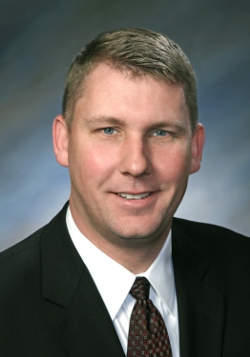Mr. Kowalski joined Mercy Health as COO of Western Hills Hospital and later became president and CEO of Western Hills, which is based in Cincinnati. Before becoming CFO, he was COO for Mercy Health — West Hospitals. In that role, he oversaw the planning, strategy and execution of opening Mercy Health’s West Hospital in Cincinnati.

Question: What’s your take on the increasing call for healthcare pricing transparency? Mercy’s website says the system is committed to giving patients information on hospital charges, so it seems like you guys are already on top of that.
Patrick Kowalski: As part of Catholic Health Partners, we’re going about this so we answer that question as a system and not just as Mercy Health. Globally, we’re still in the early stages and don’t have that work complete, but we are working through what that will look like.
I’m very big on transparency. Whether it’s what the cost of that care is or what our pricing is, it’s good to know. Our consumers are getting more and more educated, and there’s much more focus on out-of-pocket costs with different health plans. I think it’s very important for us to be upfront with our patients. Our financial advisors work with patients to provide them cost estimates before procedures, etc.
Q: What are the biggest financial challenges Mercy is facing right now?
PK: There are many, but I like to focus on three. Number one is managing the current and future states of healthcare in a per-click environment today versus population health in the future. Planning for population health requires a lot of investment in that new model.
Number two is coming up with the right care delivery model. I’m a big advocate of the statement, “We don’t deliver care to make money, but we need to continue to make money to deliver care.”
A third one is really engaging and partnering with our patients to improve their health and wellness. I don’t think, concurrently and long-term, we’ll truly be successful unless we engage our patients. I’m saying that as a healthcare executive, but I’m saying it as a patient as well. I’ve gone through some things with my own life where I realize I didn’t take ownership of my own healthcare. I think that’s a big challenge as we go down this road over the next three, four or five years.
Q: During your time as COO for Mercy Health — West Hospitals, what would you say you learned from spearheading the opening of Mercy Health’s West Hospital in Cincinnati?
PK: I think it really helped solidify something I already knew, which is how great a team we have here. It was the execution of a vision of building a network of care for the west side of town. The physicians and caregivers were so instrumental in the design of that facility. It was neat to see them in a different way, thinking about how we were designing healthcare not just for the short-term but the long-term.
And, as a resident of that side of town, to see what was coming up in the community where I live was just very rewarding.
Q: What initiatives does Mercy Health have underway that you’re excited about?
PK: We’re always looking at things, but the one that stands out to me is the work we’ve started to do around the accountable care organization. We were one of the first to do that work a year or two ago and remain the only ACO in Cincinnati. Now, as part of the Catholic Health Partners system, we’re taking the Mercy Health model from Cincinnati, and we’re expanding that model throughout the state of Ohio. That’s pretty exciting and innovative work.
Q: Healthcare providers are facing a lot of uncertainty now, since it’s unclear how the Patient Protection and Affordable Care Act marketplaces will play out. What do you think CFOs and other hospital executives should be focusing on in the midst of the fog surrounding healthcare reform?
PK: It comes back to the statement that we don’t do this work to make money, but we need to make money to do this work. Talking to your teams, using information and analytical reports and really sitting down together to make the best use of resources is something we should all be focusing on.
Whether we use those numbers to affect quality, experience or cost, we’re in a great position to help our teams achieve goals in any of those arenas. We are here for the patients. We want to give them high-quality, great service at a decent cost. I think the finance strategy role is really in a position to help the people within their organizations to do that.
You can’t pick up a publication these days without seeing some kind of negative outlook. It’s easy to be negative, but we also need to be cheerleaders and positive about what we can do. I’m excited about the road ahead. Is it scary? A little bit, sure. But when you think about your team and you put your heads together, you can accomplish more than you can apart.
More Articles on Hospital and Health System CFOs:
Transforming to Achieve the Triple Aim: Q&A With Jill Batty, CFO of Cambridge Health Alliance
The 3 CFOs Behind HFMA’s Financial Communication Best Practices
Getting Involved at Every Level: Q&A With Bayhealth CFO Mike Tretina
